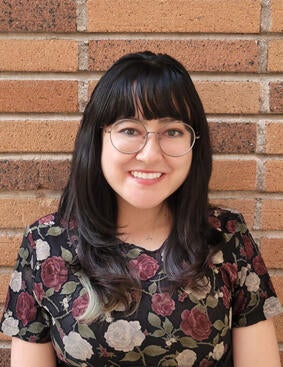Jamiela Kokash, a student in the Neuroscience Graduate Program at UC Riverside, has been awarded a UC President’s Pre-Professoriate Fellowship, which will support her dissertation research on how auditory regions of the brain change after noise-induced hearing loss, and how these changes can be potentially prevented or delayed.
Specifically, Kokash’s dissertation research identifies molecular and electrophysiological components affected in the auditory cortex after hearing loss, and how the brain’s ability to respond to sounds is altered.
Kokash, who received her bachelor’s degree in biological sciences in 2014 from UC Irvine, started the same year as a technician in the laboratory of Khaleel A. Razak, a professor of psychology at UCR. She expects to graduate with her doctoral degree in 2022.
“Jamiela ticks every box in terms of high achievements as a graduate student,” Razak said. “She has excelled in her research and growth as an independent scientist. She is an outstanding teacher and mentor.”
Razak explained that no effective treatments are currently available to prevent abnormal neural responses following hearing loss, which can lead to tinnitus and speech recognition impairment.
“Jamiela’s research identifies molecular pathways that lead from noise-induced hearing loss to pathological responses in the auditory cortex,” he said. “Identifications of cellular pathways could lead to therapeutic approaches.”
The fellowship covers Kokash’s tuition for her last year at UCR, allowing her to fully immerse herself in the final stages of her dissertation project.
“This fellowship validates the impact of my research for future therapeutic applications,” she said. “I would like to thank my mentors, including my research advisor, Dr. Khaleel Razak, as well as my lab mates for being the best team in creating the most intellectually nourishing environment.”
Kokash’s long-term career goal is to identify and target potential ways to delay or prevent brain changes following hearing loss. Noise-induced hearing loss is an international problem, she said, which spans socioeconomic and generational barriers.
“Loud and sudden sounds like explosions or long-term exposure to heavy machinery can have lasting detrimental effects on the auditory system, both in the ear and in the brain,” she added. “These problems are likely to be exacerbated by the increasing recreational use of in-ear devices.”
After graduate school, Kokash would like to work as a postdoctoral fellow to continue her professional development and make herself more competitive to reach her career goals.
“I plan to seek a career that will allow me to work closely with undergraduate students who seek higher education and professional development,” she said. “Working as a professor not only will allow me to pursue my passion for teaching, but also give me a platform to work as a mentor to future scholars. In this capacity, it will allow me to pay forward the phenomenal guidance my own mentors granted me.”
